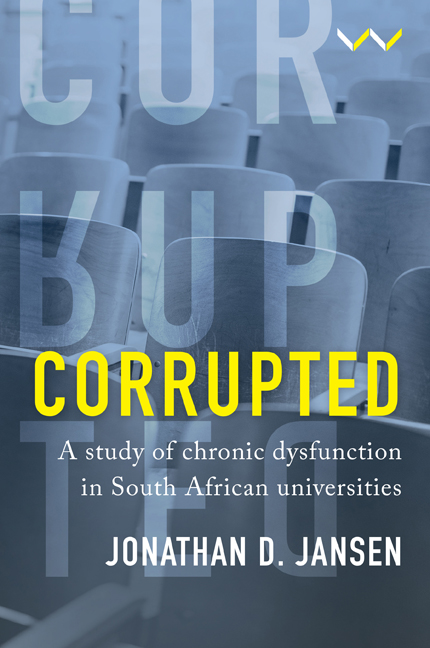Book contents
- Frontmatter
- Contents
- Acknowledgements
- Acronyms and Abbreviations
- Map: South African Universities
- Chapter 1 A Study of Chronic Dysfunction in Universities
- Chapter 2 Historical Roots of Dysfunction: Shaping the South African University
- Chapter 3 Dysfunctionality in Universities: A Political Economy Perspective
- Chapter 4 A Personal Journey Through the Political Economy of Universities
- Chapter 5 Casting Long Shadows: How History Shapes the Politics of Universities In South Africa
- Chapter 6 The University as a Concentrated and Exploitable Resource
- Chapter 7 The University as a Criminal Enterprise
- Chapter 8 The Micropolitics of Corruption in Universities
- Chapter 9 The Twin Roots of Chronic Dysfunctionality in Universities
- Chapter 10 Rethinking and Rebuilding Dysfunctional South African Universities
- Appendices
- Notes
- References
- Index
Chapter 6 - The University as a Concentrated and Exploitable Resource
Published online by Cambridge University Press: 29 November 2023
- Frontmatter
- Contents
- Acknowledgements
- Acronyms and Abbreviations
- Map: South African Universities
- Chapter 1 A Study of Chronic Dysfunction in Universities
- Chapter 2 Historical Roots of Dysfunction: Shaping the South African University
- Chapter 3 Dysfunctionality in Universities: A Political Economy Perspective
- Chapter 4 A Personal Journey Through the Political Economy of Universities
- Chapter 5 Casting Long Shadows: How History Shapes the Politics of Universities In South Africa
- Chapter 6 The University as a Concentrated and Exploitable Resource
- Chapter 7 The University as a Criminal Enterprise
- Chapter 8 The Micropolitics of Corruption in Universities
- Chapter 9 The Twin Roots of Chronic Dysfunctionality in Universities
- Chapter 10 Rethinking and Rebuilding Dysfunctional South African Universities
- Appendices
- Notes
- References
- Index
Summary
When Sibongile Mani woke up on the morning of 1 June 2017, the undergraduate accounting student from Walter Sisulu University must have thought that all her prayers had been answered. There, popping up in her bank account, was no less than R14 million, rather than the measly R1 400 monthly transfer for meals and books that she received from the state-funded National Student Financial Aid Scheme (NSFAS).
Instead of reporting the erroneous transfer to her university or the scheme, Mani decided instead to go shopping, spending R820 000 in 73 days on everything from Peruvian wigs to expensive smartphones. The Queenstown grandmother who raised Mani lives in a dilapidated structure and felt that the money could have been better spent: ‘She should have built me a house instead of buying hair and such nonsense.’
To those outside South African universities, several questions must have been raised by the Mani debacle. One had to be the vulnerability of systems that could allow what officials called ‘a technical glitch’ to transfer R14 million of state funding to a student's personal account; indeed, NSFAS only discovered the error more than two months later, on 13 August 2017. Then there is the question of accountability. NSFAS officials said no one was to blame, as the prosecuting authority pondered whether it should make a criminal or civil case. Mani would eventually be found guilty and sentenced to five years’ imprisonment for theft. An astute observer of South African society would no doubt consider some pertinent behavioural questions: How many students would have reported the unexpected windfall? How many people in the broader community would be troubled by Mani's behaviour? Her grandmother certainly had other concerns – how to spend the money properly!
The corruptibility of NSFAS as a multibillion-rand resource would surely have exercised the public mind. The diversion of the R14 million to student Mani was no technical glitch, a senior administrator at NSFAS assured me; ‘they made the mistake of diverting it to the wrong account’. Evidence at hand shows how NSFAS funds, distributed through a private company called Intellimali, could be hacked, as a note sent by them to the authorities made clear: ‘This is evidence that students intelli account are [sic] are being hacked. Student from unisa [University of South Africa] details have been changed into wsu [Walter Sisulu University] students. And the money was taken off. Kindly look at that.
- Type
- Chapter
- Information
- CorruptedA Study of Chronic Dysfunction in South African Universities, pp. 115 - 140Publisher: Wits University PressPrint publication year: 2023



